I.
I live at the edge of a clear-cut.
Literally.
The cut line is mere feet from my floor-to-ceiling windows, so that from almost anywhere in my one-room cabin the un-forest is the totality of my window’s view.
As I write this, I look out onto a near-dystopian landscape. Marine fog blowing up from the Strait of Juan de Fuca obscures the still-wooded foothills of the Olympic Mountains, and serves as a fitting backdrop for the logging slash bulldozed into several hundred piles of wasted wood. The closest of these piles is a long, tall wall about a hundred feet from where I sit. Aside from the single spindly leave-tree still standing in the distance, as well as the scatterings of stumps and the sun-burnt sword ferns clinging to life, these slash piles are all that is left of the forest: piles of broken bodies, waiting to be burned.
Without the shelter of standing trees, wind blasts against the siding of my home, rattling windows, whistling through the pores of the house, and sometimes seeming to lift the whole thing from its foundation.
It wasn’t like this a year ago.
A year ago, when I came to visit this little piece of land for the first time, seeking a new place to call home, the cabin was wrapped in a lush forest of moss-streaked maples, sentinel cedars, sword ferns, Doug firs, and so much more. A hundred shades of green dripped from the canopy, reached upward from the forest floor, and mingled in the middle. Sunlight slanted through thick branches, dotting the cabin walls with light. Sitting in the same place where I am now, I remember feeling sheltered in this little cove of forest. Now, I feel exposed.
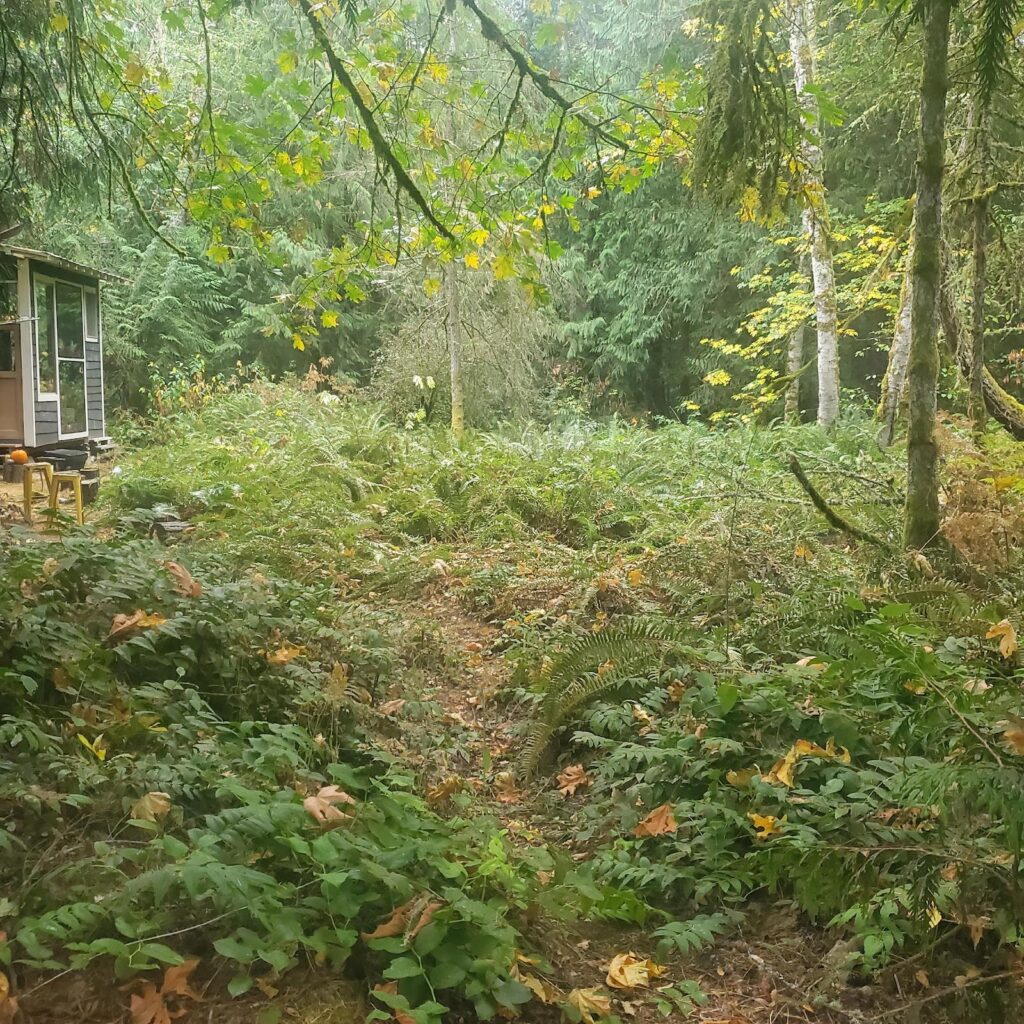
I also remember, during that first visit, seeing the survey markers tied to trees along the property line, and feeling startled by their proximity.
My previous home, just a few miles away as the crow flies, also bordered land owned by this company, and I had also lived there while they were cutting down the forest. So I was no stranger to the reality of industrial logging, nor the ruthlessness of this particular corporation. But somehow, this older, more diverse, more structurally complex forest seemed too stalwart to be going anywhere anytime soon.
Perhaps that was wishful thinking. Perhaps denial or delusion. Mostly, though, it was desperation.
My partnership was ending, and therefore my roots—which had been planted deeply in the home we shared—were seeking new soil. With the housing crisis raging on the Quimper Peninsula, my options seemed to be surrendering my beloved off-grid lifestyle for an expensive apartment in Port Townsend, or renting this inexpensive and adorable rustic cabin resting on a half-acre triangle of land, wedged between a gravel road and the uncertain certainty of the survey markers.
II.
My refuge exists in my capacity to love. If I can learn to love death then I can begin to find refuge in change.
—Terry Tempest Williams
On the first day I visited this little triangular plot of land, I squatted in the garden in the mid-summer sun, between raspberry and stinging nettle stalks and the failing fishnet fence, to pee. I remember watching wisps of moon-blood and piss merge with the soil. When I stood, I remember plucking ripe red raspberries, plopping them in my mouth and thinking: “my fertility will feed them, as they are feeding me.”
In that moment, my body recognized the sweetness of reciprocity, and I knew exactly where I needed to be.
That bodily knowing overrode any reservations I had about the fact that, at some point in the next couple of years, the forest that bordered this land would be cut, and that, if I still lived here, I would have to live through that horrific experience again. Only this time, I would have a front row seat to the devastation.
Despite knowing this, I thought I had some time to breathe and to just be here in peace. Or, perhaps, time to change the fate of this place.
I was wrong.
Only a few short weeks after I moved in, I heard the first saw buzzing in the distance. I was in the middle of building a kitchen for the cabin, feeling hopeful about home and settling in to my new rhythms. But with that first swipe of saw cutting through the quiet, my sense of refuge toppled with that tree.
Over the next weeks, the sounds of the saw got closer and closer. Cut by cruel cut, it sliced through each of my illusions.
III.
The challenge of modernity is to live without illusions without becoming disillusioned.
—Antonio Gramsci
I stayed anyway. I needed a place to live and had already invested so much here. Even still, I knew I would lose this place, for I understood clear-cutting as an act of displacement. And by displacement I mean not only an act of pushing bodies out of a place, but an act of unmaking a place.
One day, I heard the un-making happening much closer to the cabin than usual. I wanted to see just how close, so I ventured into the forest to find out.
The noisiness of the machine both oriented and disoriented me. I could follow the sound, but it also seemed to bounce around and surround me. Finding the source was further disorienting. It just didn’t seem possible to be walking through this thick forest with no roads nearby and find such an enormous machine.
Hidden, I watched the mechanical arm grab tree after tree, slice swiftly through their trunks, and send them crashing against the ground. I tried to keep a safe distance, but curiosity and an attempt to document drew me closer. In my distraction I didn’t really realize how much danger I was in. That is, until a tree fell in my direction.
The removal of that tree put the monster in clearer view so I could even see the face of the man inside. I ducked behind a larger cedar in an attempt to stay safe and out of sight. But the machine kept moving toward me.
Perceiving the danger almost too late, I turned into a wild animal—prey with an oncoming predator—and ran straight back from the cedar until I reached another one and dashed behind it. I looked back at my pursuer in time to see another tree crash adjacent to where I’d been hiding. I stared and wondered if the branches that landed there would have killed me. I quickly decided I didn’t want to find out and ran again, bushwhacking blindly, not looking back this time.
Finally, I found my bearings, crossed the property line with great relief, and returned to the relative refuge of my cabin. I couldn’t stay inside long though. My body, shaken, needed to be around other bodies to regulate. The only way I could see coming down from what had happened to me, and what was still happening to the forest, was to be with the forest.
I went in the opposite direction of the noise this time, and found myself among a grove of giant maples. They reached in every direction with thick and twisted branches, dripping with Old Man’s Beard and coated in many hues of soft green.
Mesmerized, I stared upward and spun in circles in wonder. Then, I lay on a mossy log and breathed until my nervous system synced back up with the pace and serenity of the trees, rather than the scream of the machine.
IV.
Clear-cutting is disorienting. It destroys all points of orientation.
—my journal entry from later that night
When in the evening I decided to return to the scene, it took everything in me to keep walking toward the devastation. It was an act of will to keep upright. Gravity itself felt heavier.
The words gravity and grief share the same root, gravis, meaning heavy. I think of grief as perceiving the weight of the truth of loss in our bodies.
And in that moment the truth was this: I could see light where there hadn’t been light. Where there had been forest, there was no forest. That whole section of trees had been leveled. It looked as if a giant had come down from the sky and mowed his lawn.
I found myself on all fours, my body involuntarily undulating with dry heaves. The sickness that had been building in my stomach for weeks intensified and took me over. Nothing but saliva came out, not even bile, but my body kept trying to purge something rotten inside me. Instead, a throaty roar emerged from the depth of me, along with a river of questions that poured from my mouth—why and what and how and how and why?
I finally sat up, dizzy, trying to find some reference points, but the world had been turned over, torn, rendered unrecognizable. The place had been unmade.
What did feel familiar, though, sitting under the stars amid the wreckage, was the piles of bodies of trees. I’d seen this before in my previous homes, and in clear-cuts along the highway, but they reminded me of something else, too.
On my trip to Auschwitz a few years back, exploring my ancestry in relation to the Holocaust, I’d seen image after image of human bodies piled in mass graves; I’d seen rooms full of shoes, hair, luggage, kitchen utensils, piled behind plexi-glass. Piles of the dead, selfishly, violently, unceremoniously ripped from their lives and stacked as if they were nothing.
Looking at the un-forest, I thought of the long legacies of war and displacement—the villages torched, the bodies taken, broken, burnt. I thought of all the apocalypses our species has lived through, all the horrors endured. I felt the sick initiation of it, and saw myself suddenly joining the ranks of those who survived long enough to tell the tale or pass along the genetics of survival. And I remembered: I am made up of those genes.
I silently thanked those ancestors for surviving long enough to make the bodies that made my body. And I thanked the genes in my body that know what it takes to survive such displacement, disorientation, and dismemberment as this.
Around me, the still-standing trees seemed to talk to each other. They creaked and cried. I swear to you, some of them were crying. I’ve never heard a tree keen until that night.
But they kept standing.
So eventually I stood up too.
Over the next months, I begged those trees to uproot and run, or fight back, or something. What they did was stand their ground.
So I did too.
V.
The two primary sins of Western civilization: amnesia and anesthesia—we forget and we go numb.
—Francis Weller
I wanted to offer my body as a witness to what was left of the forest. I wanted to be a body experiencing the body of the forest, and all the bodies that make it up. I wanted them to feel the love of my body against theirs, before they felt the selfish swipe of the saw. I wanted them to be felt and remembered.
So, once again, I ignored the cruel rule of the red ribbons marking the property line, warning me not to cross them, and I crossed them.
And I crossed them.
And I crossed them.
Every evening, usually after dark, I stepped barefoot across that line to wander through the doomed forest. Under the cover of night, bringing no light, I let my feet feel their way between mahonia and sword fern, over the soft litter of the leaves and the hard roots elbowing up, under a varied canopy of maple, cedar, fir, and alder.
Step by step, November night by December night, my body learned this forest—its rises and its falls, its roots and branches, its shapes and shadows, its sounds and stirrings, its rhythms and relationships.
It didn’t take many nights of this ritual before my cat, Grendel, started to join me—sometimes leading, other times following, sometimes staying underfoot, other times riding my shoulders, and yet other times bolting off into the darkness.
Being a cat, Grendel’s body was more attuned than mine will ever be to walking through the dark, to the ways of the wild. This became abundantly clear one night as we were walking together, talking to each other—him meowing, looking up at me inquiringly, and me looking down at him cooing my love in return. Suddenly his body went silent and stiff beside me. My attunement to his physiology is the only reason I stopped and quieted enough to notice the noise in the brush ahead. A large animal, ahead and to the left, was moving slowly through the under-story.
My mind raced through the possibilities—deer, elk, coyote—landing of course on the worst of the litany: cougar. I gathered Grendel in my arms and took a few steps backward, naturally snapping a branch underfoot. The noise startled the animal, who immediately took off in the opposite direction, snapping and crashing through the woods.
I cut my trip short for the night, feeling distinctly the facts of my body in this place: my vulnerability to its dangers and to its wonders, my ignorances and insensitivities. I felt myself both apart from and a part of the other bodies here, startling and being startled, shaping and being shaped. There was communion and competition. Protection, defensiveness, curiosity, fear, welcome, and unwelcome.
But mostly, there was the feeling that we were all bodies—alive and breathing—together sharing this place.
That night, I felt the boundaries between me and the land begin to dissolve.
VI.
Devastation respects no boundaries.
—Terry Tempest Williams
The owls left first, their haunting hoots receding night by night.
Then, one day, I watched the birds flee from the noise of the machines. They took refuge near my roof before flitting across the road, further from the commotion. I thought of how the animals of the forest would have no way to know which direction was safest to go—no way of understanding survey markers or property lines or where the edge of the devastation might land. All they could know was: this place is no longer safe. I must leave.
Witnessing the animal flee, I questioned the sanity in staying. But I stayed, and Grendel stayed with me, and night by night,we walked through the shrinking forest.
Over the coming day and weeks, as I watched the forest recede, I had to continually seek new points of orientation. I would get to know one line of trees and then it would be gone. Each time, the whole familiar face of the place changed. I kept thinking I was somewhere that I wasn’t, looking for trees that were no longer there. The edge had moved—still the edge, but a different edge.
I was also encountering my own edges—of curiosity, grief, discomfort. There was rarely a night that I wanted to go out on my walks. It seemed much easier to stay inside and watch a stupid show on my computer, or read a book, or just sleep. I kept forcing myself to go out because every time I did I came back feeling more alive—even if that aliveness was manifest in grief or rage or confusion. Honestly, though, it was often joy.
Regardless of my mental state, my body consistently felt better after walking barefoot through the deep duff. Even if my feet were frozen to the bone by the time I got back, I was always grateful I went. My cells would sing. And I always slept better afterward.
That is, until I didn’t.
I can’t describe to you what it felt like to wake up in the early morning dark to bright work lights shining through the forest, through my windows, and straight into my eyes as I rested in the supposed sanctuary of my bed.
I could see the lights were in a section of forest that was dear to me, though the company had agreed to warn me before they cut any closer to the house. You might think, after my first experience with the machine, the obvious response would be to run away from the noise, or at least stay inside. But something deeply protective and instinctual came over me.
When I heard the saw start, I was out the door before I could think, wearing some semblance of dress and careening through the darkness.
The adrenaline stopped short of running me into my death, but the man operating the machine took longer to see me than I expected. The blade arm had swung close to me, and he was mid-cut into a tree—one I knew well—before he saw me flapping my arms and screaming. He stopped the machine mid-cut.
After a strange exchange, where I sobbed and pleaded and he told me “I’m just doing my job, squaring off this corner,” the man agreed to move his work elsewhere for a while to give me time to say goodbye.
An hour or so later, from inside my cabin holding hands with a friend, I watched that place be erased.
~~~
From then on, the company kept me diligently abreast of when they would be cutting along the property line.
The morning it was finally happening, after weeks of delays due to snow and wind, I left early with Grendel, having decided to bring him back to my former home while they cut adjacent to the house. I was afraid he would run away from the noise as all the other animals had, or be trapped inside and scared. As for myself, I had originally wanted to witness and document the process from the property line, but my friends urged me otherwise, so I retreated as well.
Driving away in the dark, as the lights of the logging machines descended on the forest, I felt like a refugee fleeing the destruction of my home.
VII.
It may be that hypersensitivity to the ecological unraveling of the only home we know is the necessary condition of an attuned few who can awaken the rest of us to the existential nature of the ecological crisis we face.
—Christopher Ketcham
On the day I returned, finding the rest of my forest fallen, I thought my body would be sucked through the ground, the force of grief was so powerful, so heavy. It was as though the trees themselves were what controlled the degree of gravity, and with their heavy bodies on the ground, it seemed nothing else could stand either.
I crawled. Gasped. Wailed. Screamed. Sounds I have never heard come out of any body came out of me. I felt as if I had lost limbs and lungs. I felt as if I had been broken into ten million pieces along with the forest.
And the sky had fallen. Literally.
To say it was the worst day of my life—to say much of anything about it for that matter—distorts the horror into something perhaps comprehensible, when in fact what I witnessed and felt was beyond comprehension or even sanity.
Indeed, I went mad with grief.
A few days into this madness, I found myself sitting barefoot in the January cold, picking up wedges of trees from the ground and trying to piece them together on their stumps, as if the clear-cut were the world’s largest puzzle. Like a child whose toy had been broken, I kept saying to myself as I cried: “I remember how the forest went. I can put it back together. I remember how these trees looked. I can fix this. I can fix this…”
I could not.
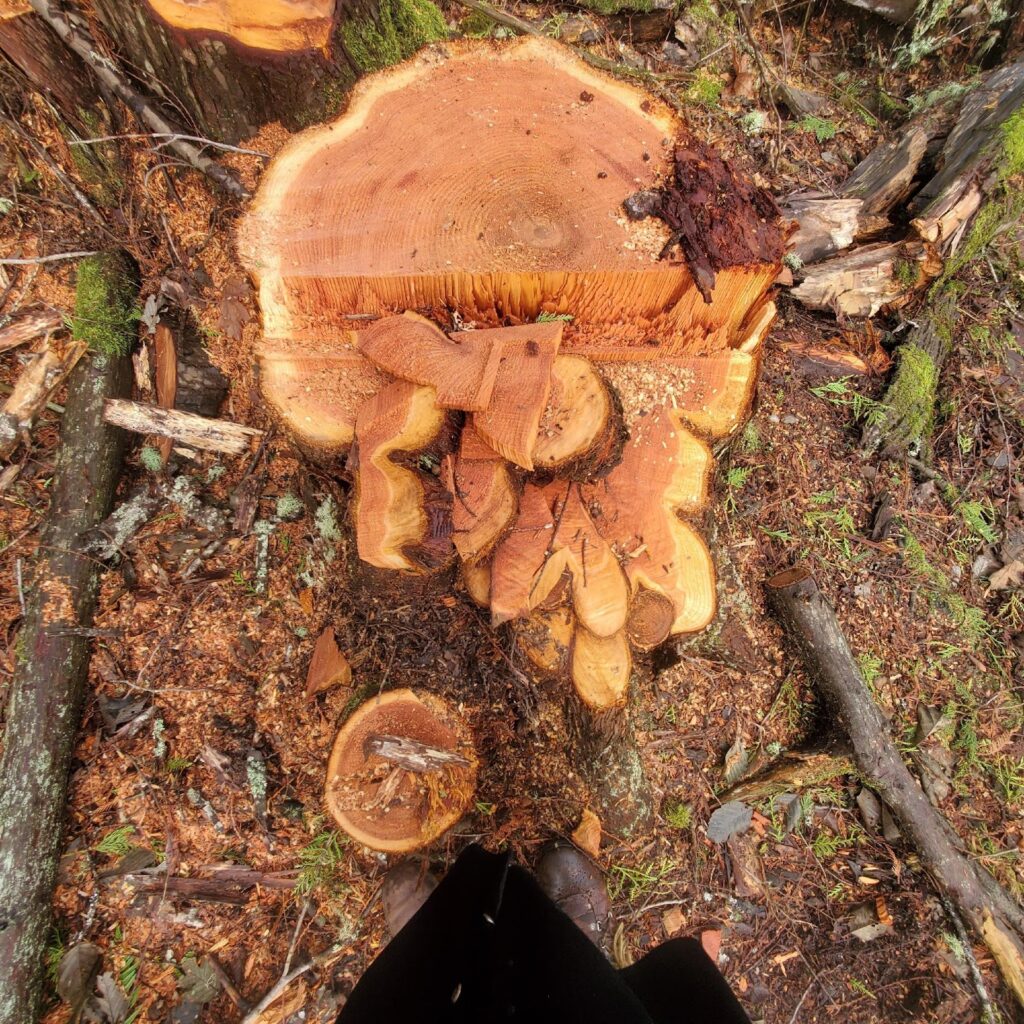
VIII.
Health is membership. […] We must consider the body’s manifold connection to other bodies and to the world.
—Wendell Berry
When I eventually brought Grendel home, after they’d hauled the trees away, I relived my own experience by watching his. The cabin was the same—he sniffed around and found his favorite spots and seemed to relax—but when he looked out the window, his body stiffened. He stared out across the cut and then back into the cabin, out and back and out, clearly confused. How could this be the same place, but not?
I wanted to keep him inside for a while, to help him settle, but he insisted on going out right away. I followed him, his feet finding the path we always took, but leading us through a different landscape. He slowed down, meowing soft questions and sniffing stumps and looking and looking and looking. He seemed so lost.
From there, looking back at the cabin against the backdrop of the cut instead of the backdrop of the forest, it looked as though the now constant winds had lifted it from its foundation and, like Dorothy’s house in the Wizard of Oz, dropped us in a completely new land. Only, instead of going from a black-and-white world to a world of color, my home had started in a world of vibrancy, and had been dropped into a land of desolation.
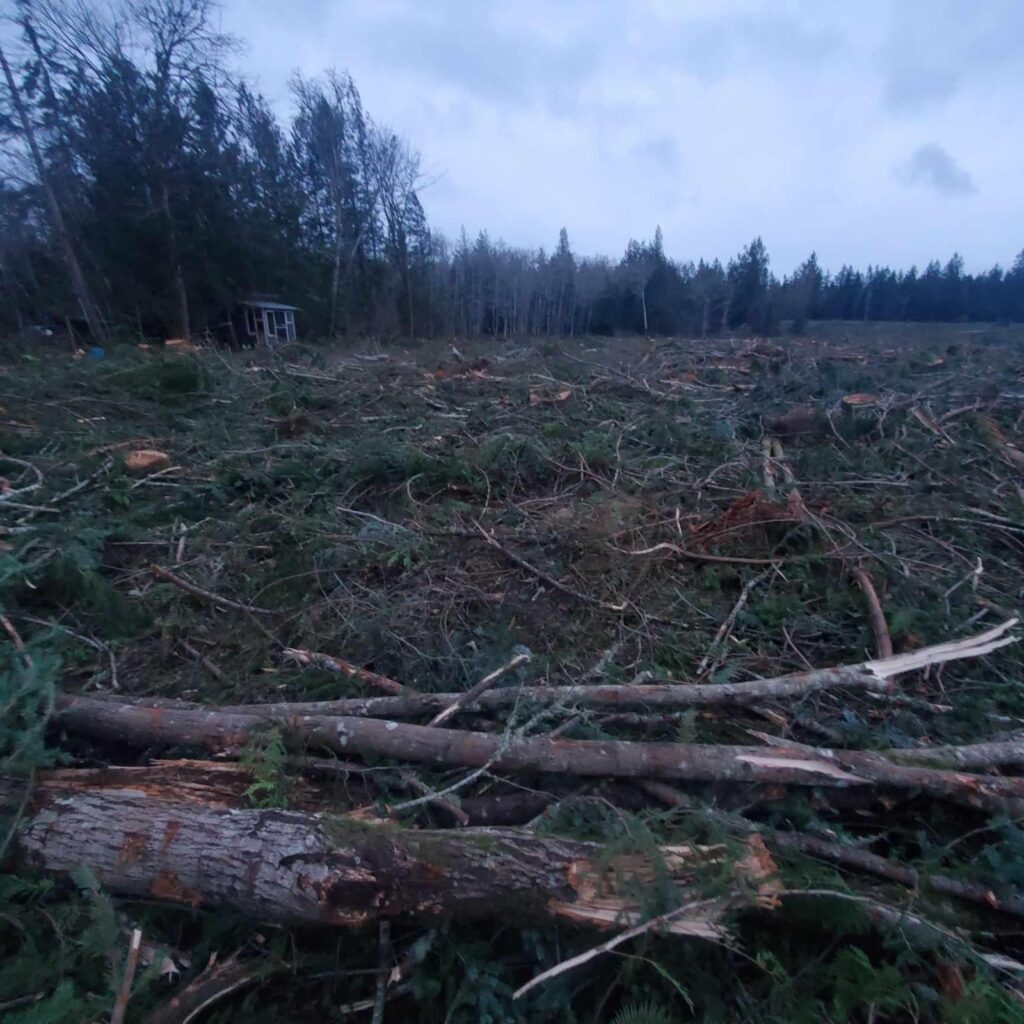
Grendel and I continued our nightly walks, at least as often as my heart could stand to. There were many nights when my nervous system couldn’t handle it.
These walks were different. No longer would I come back enlivened, but heavy. And Grendel never ventured far from me anymore. He’d often stand on my feet and just stare. His meows all seemed sad, elongated, longing, and punctuated with question marks.
When the trees were still on the ground waiting to be hauled away, I did more climbing, stumbling, crawling, and falling than walking. I looked for the trunks and stumps of trees I knew, attempting orientation. I was only ever able to recognize a few, but whenever I did I was surprised at the relief I felt in my body. It offered some evidence that this was the same place, and reoriented me. I would lay my body on their body, and cry and sing and breathe in a way I couldn’t otherwise during that time.
Sometimes I would visit the trees still standing on the cabin side of the cut line, and wonder if they had been waiting for their turn to be cut, only to be spared. I wondered if they wondered why the machine had left them to bear witness, at the edge of the devastation. I know I did.
And even on the days I didn’t cross that edge, or even look at it, the clear-cut was always still reaching back across to touch me.
There is a cost to dissociating, to forgetting, to turning away. But there is also a cost to not. How do I feel all of this, or how much of it do I feel? These are constant questions for me.
To live at the edge of devastation, and to not forget or go numb, is to bear bodily witness to the devastation. It is to pay a part of the actual cost of the clear-cut..
On the other hand, to dissociate and turn away, to not let the grief move through, is also to pay a price. Not only do we miss out on our humanity when we refuse to feel, but that unprocessed pain can linger in our bodies and turn to disease.
Either way, the cost is too much. Too much for one body. Too much for all bodies.
Over the course of this year, I’ve developed tremors—violent body jolts, like hiccups on steroids that originate in my chest. If I hear a machine, see lights reflecting off my window from the road at night, if the movie is too loud, if I pass a clear-cut, my body rebels. It got so bad one day I thought I was having a stroke. This is one way my body is trying to process what it has seen.
In order to cope, in order to keep coming home every day to the edge of the clear-cut, and not be continually destroyed, I have had to lean into some level of dissociation, some level of anesthetization, some level, even, of amnesia.
But I also know that in order to keep living here—not just at the edge of the clear-cut, but in this world as we teeter at the edge of every devastation—I also need to keep feeling. I need to keep remembering. I need to keep associating—finding association and kinship—and staying in living, dynamic relationship with this place and the world at large. Even if it is no longer what it was or what I want it to be; even if more of it is going to be lost.
If I don’t do this, I might as well have died with the forest.
CODA
I.
There will be no managed retreat.
—Aviva Rahmani
The landscape keeps changing.
When they hauled the trees away, I realized that even their severed, broken bodies were more comforting to me than the emptiness they left behind.
The wind became a constant companion. When it rips against the cabin walls, I miss the sound of the treetops slowing it down with their dance. In winter, it got even worse and ripped my woodshed apart.
Months later, spring came and the brown sprawl of stumps started to green with weeds. The maple stumps sprouted and grew new leaves. With clear skies and a collapsed skyline, I found I could see the mountains—a strange consolation prize for surviving. Everything softened and hope for ease sprang in me. But prematurely.
The company came back and sprayed glyphosate to kill off any competition to their Douglas fir cash crop. I was thankfully able to garner a 25-foot buffer from my house where they didn’t spray, and within a week, the contrast between the sprayed and the unsprayed land was stark. Still, run-off respects no boundaries, and suddenly the distance I was willing to range with bare feet was reduced to almost nothing.
My refuge continues to recede. Sometimes I just want to leave, to find a real refuge, somewhere untouched by the insanity of industrial extraction. But I’m not even sure that exists anymore.
Instead, I hold my ground, here, tending and witnessing.
~~~
Today, about a year after that first swipe of saw sounded across the forest, the company returned and began burning the slash piles. The remains of the bodies of that beloved forest turn to smoke before my eyes and drift away from this place. A final procession.
I can’t help but think of the bodies of humans billowing as smoke from the chimneys at Auschwitz. How the neighbors could see and smell the smoke and maybe even hear the screams, day in and day out. Most did nothing. Most of the world knew what was happening and did nothing.
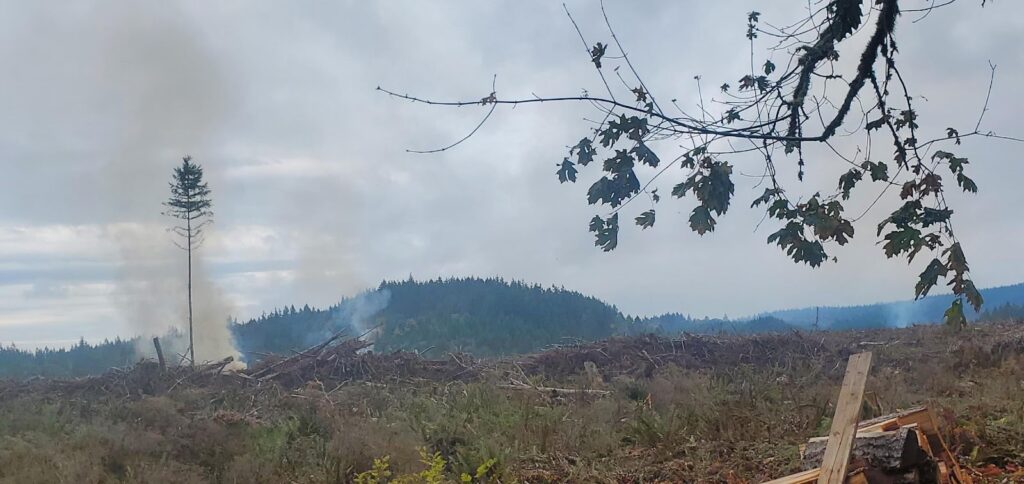
II.
Finding beauty in a broken world is creating beauty in the world we find.
—Terry Tempest Williams
A month or so ago, in late summer, my friend helped me rebuild my wood shed. He’d recently learned timber framing and we decided we could salvage some of the slash to build it in that way.
We picked through the piles of dismembered trees and found an abundance of usable timbers. Then, over the course of weeks, using wedges, chisels, hand saws, and sledge hammers, we notched, split, cut, and joined the wood into a shed. With 2x4s and plywood I had salvaged from a tree-house that also would have been destroyed by the logging company, we built a roof frame, adding the metal roofing from the old shed on top.
When it was finally finished, standing just adjacent to my cabin at the edge of the clear-cut, the shed appeared to me as a body in itself, born in and of this place, born of the consummation between my body and the other bodies of this place.
Seeing the four posts standing upright, I realized I had helped resurrect pieces of the trees so they could stand, once again, in dignity on this land. I had taken their dismembered bodies—bodies that had been removed from the membership of the forest—and re-membered them, and joined in a new membership with them. If nothing else, my body had facilitated these bodies staying in their place.
Their place, which is now my place too.
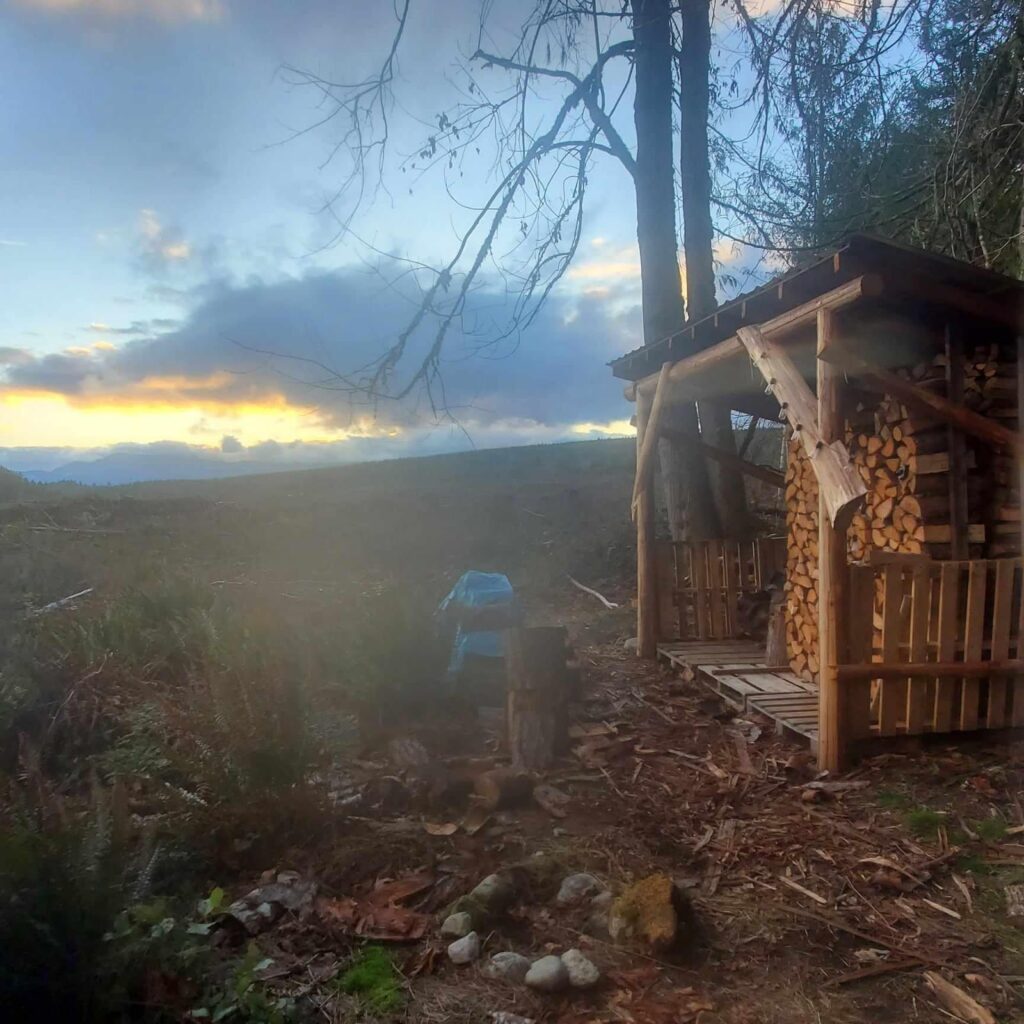
Bibliography of Epigraphs
II.“My refuge exists in my capacity…”
Williams, Terry Tempest. Refuge: An Unnatural History of Family and Place. Vintage Publishing; 1992.
III. “The challenge of modernity…”
Gramsci, Antonio. Letters from Prison. Columbia University Press; 1973.
IV. “Clear-cutting is disorienting…”
my personal journals, 2023
V. “The two primary sins of Western civilization…”
Weller, Francis. The Wild Edge of Sorrow: Rituals of Renewal and the Sacred Work of Grief. North Atlantic Books; 2015.
VI. “Devastation respects no boundaries.”
Williams, Terry Tempest. Refuge: An Unnatural History of Family and Place. Vintage Publishing; 1992.
VI. “It may be that hypersensitivity…”
Ketcham, Christopher. “The Machine Breaker,” Harper’s Magazine. (November 2023.) https://harpers.org/archive/2023/11/the-machine-breaker/
VIII. Health is membership…”
Berry, Wendell. “Health is Membership.” The Art of the Commonplace. Counterpoint Press; 2002.
Coda
I. “There will be no managed retreat.”
Rahmani, Aviva. “There Will Be No Managed Retreat,” Dark Matter: Women Witnessing. (May 2023).
II. “Finding beauty in a broken world…”
Williams, Terry Tempest. Finding Beauty in a Broken World. Vintage Publishing; 2009.
About the Author
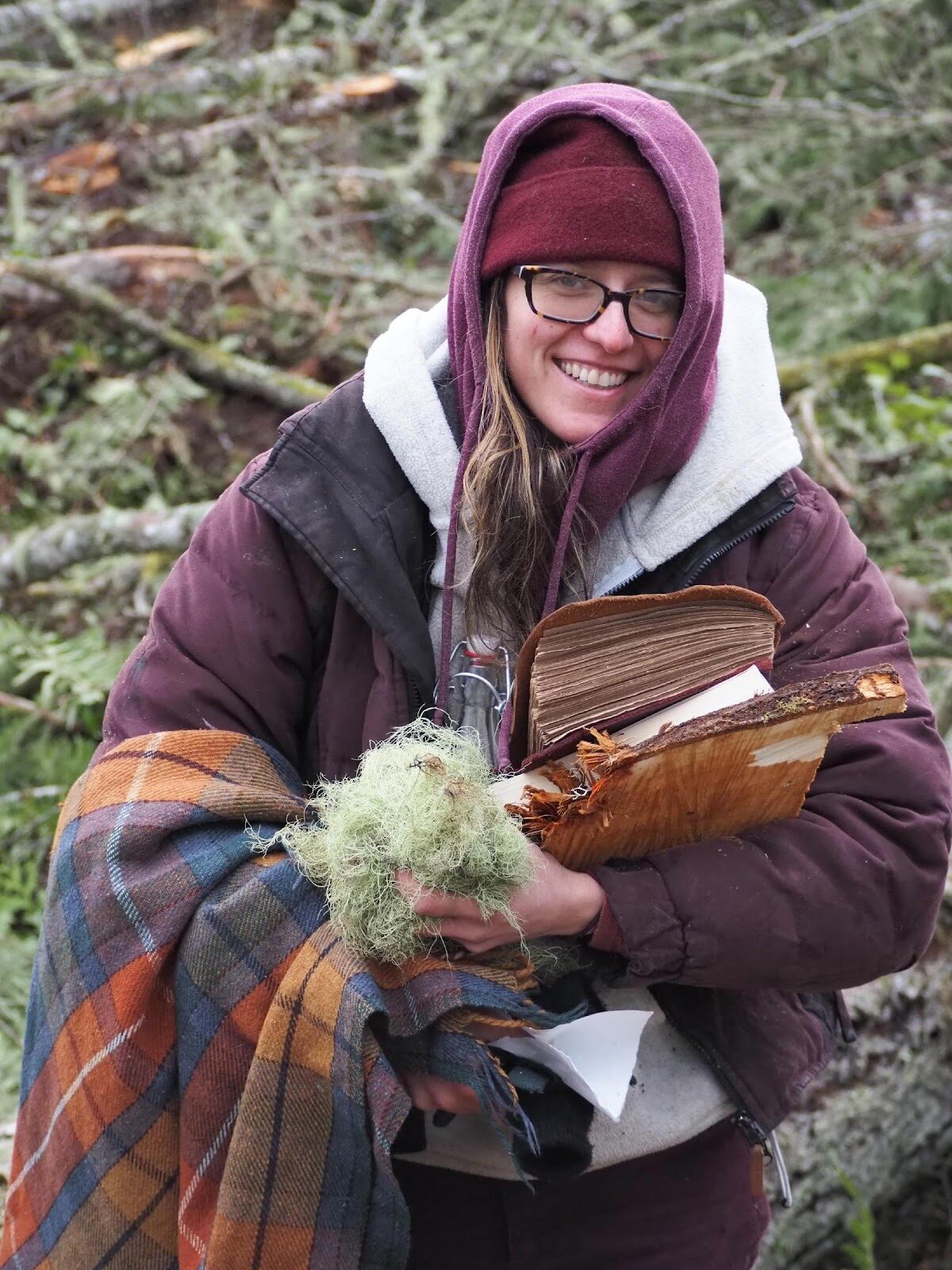
Alex C. Eisenberg is a child of the western high desert and the pacific northwest rainforest with ancestry from eastern and central Europe. A writer, circus performer, homesteader, grief tender, and activist, Alex follows many threads of passion which she hopes weave together in service to healing ancestral, social, and ecological wounds. Alex lives, cooks, and writes by candlelight in a tiny off-grid cabin at the base of the Olympic Mountains with her beloved cat, Grendel, and is blessed with an abundance of community in the surrounding area. To read more of her work visit alexandriaceisenberg.wordpress.com or follow her @owlex.eisenbird on instagram.
Return to top